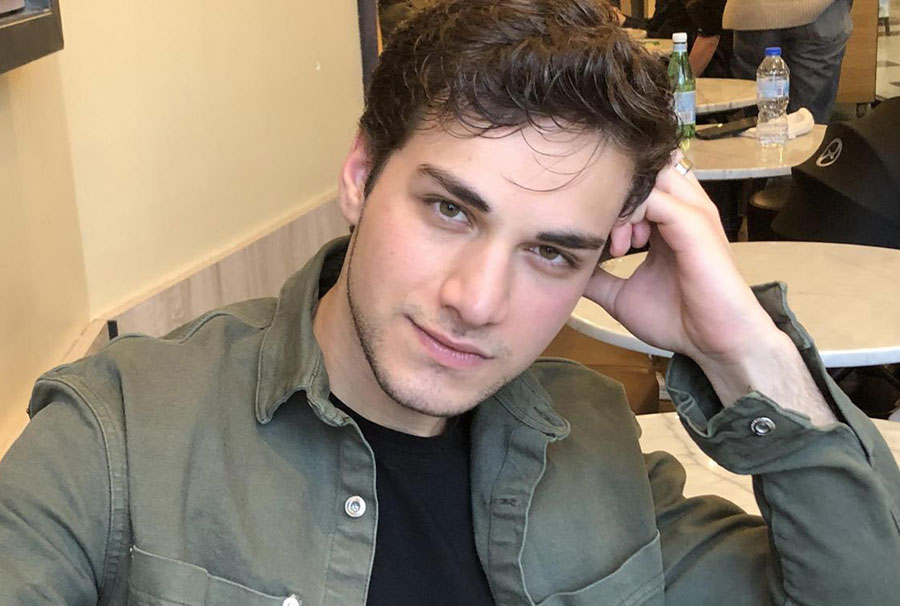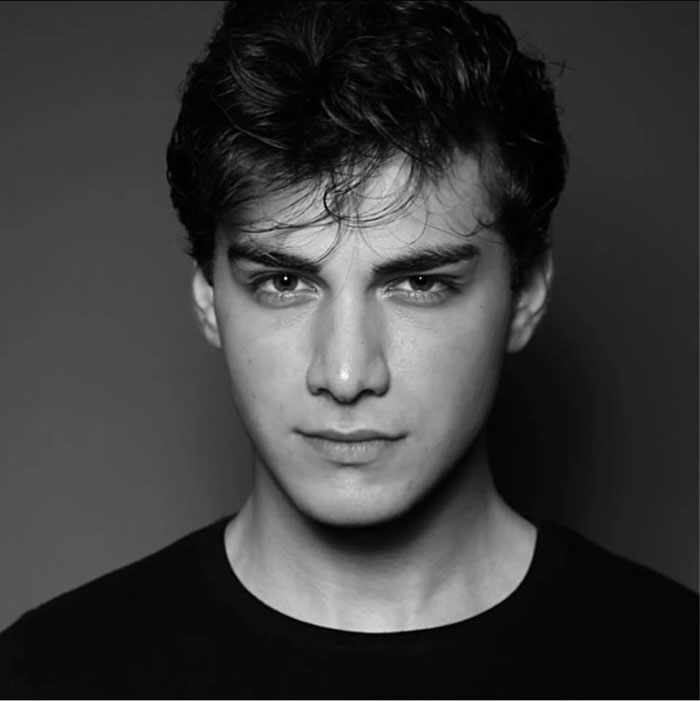by Milena Baghdasaryan
In the rich history of Roméo and Juliette, the French version of the classic tale that has captivated audiences around the world for two decades, something exciting has happened. Meet Hakob Ghasabian, a young actor of Armenian origin who has taken over the role of Roméo, previously played by Damien Sargue for two decades.
Ghasabian is no stranger to the stage, having already made his mark in Europe with many remarkable performances. Yet, his journey with Roméo and Juliette was quite a ride, taking him on a whirlwind tour across China for four months, where he performed in 24 cities.
In my interview with Ghasabian for the Weekly, we discussed what it means to step into such big shoes after Sargue’s long tenure. We talked about bringing his own style to the character, his musical inspirations and his strong connection to his Armenian heritage.
Join me in exploring the story of the Armenian Roméo of the most famous French musical!
Milena Baghdasaryan (M.B.): How does it feel to be the first actor to step into the role of Roméo after Damien Sargue’s 20-year tenure? Did you feel any pressure taking on such an iconic role?
Hakob Ghasabian (H.G.): It was so stressful and yet so exciting for me to be the first, after Damien, to perform as Roméo in the French version of the worldwide story of Roméo and Juliette. When the producer called me to ask if I was interested in playing this role on a huge tour in China consisting of 90 shows, I thought it was a joke, and I couldn’t believe it. It felt like I was dreaming! I had just finished another tour in France with 85 shows in the musical Je vais t’aimer, and I was on vacation thinking about what I would do next when this proposal suddenly came to me. I was so happy…I remember the producer asked me to record the most difficult song of the musical called “J’ai peur,” and I didn’t know this song at all. So, all night long, I worked so hard, recorded it in my studio and sent it to her at 6:00 in the morning. She was impressed and told me to pack my bags, and one month later, we were in Shanghai.
M.B.: In what ways do you believe your portrayal of Roméo differs from Damien Sargue’s interpretation? Are there any elements you specifically aimed to bring to the character?
H.G.: You know, for me, Damien is a mentor, and I wanted to learn everything from him, because he’s an incredible performer. After all these years, he’s still the same hard worker and strong artist he was 20 years ago. Most of all (and this is very important from my perspective), he is such a good person, always radiating good vibes and making people around him feel good and confident.
But at the same time, I wanted to portray my version of Roméo and not simply copy his way of doing things, because we are two different artists with different voices, ages and experiences. So, I aimed to portray the young Roméo as he’s depicted in the original story: insecure yet deeply in love. Perhaps I brought a breath of fresh air to the role, because Damien is now 42, whereas I’m 20, so I’m closer to Roméo’s age.
M.B.: What do you hope audiences take away from your performances, both in Roméo and Juliette and in your other musical endeavors?
H.G.: I just want to make people who come to see my shows have a good time, forget about their daily lives and problems for two hours and enjoy the moment. You know, that is our job: the audience is our boss, and we want to make them laugh, sing and sometimes even cry, taking them to another beautiful world, like when you’re watching a movie! Always, my desire is to be sincere and honest with the people who have bought their tickets and come to see the show, including in my artistic approach, because I really enjoy giving 1,000-percent of my energy on stage. Just like that, a two-hour concert seems like 20 minutes to me, because good moments always pass quickly.
M.B.: Have there been any artists or genres that have had a significant impact on your style?
H.G.: When I was young, I always listened to Yanni and his crazy group of musicians from all around the world. They inspired me to start playing the violin, which is my first instrument. I also listened to Queen, The Beatles, Michael Jackson, Celine Dion and Charles Aznavour; they are legends to me. More recently, I love listening to Lewis Capaldi and Shawn Mendes – they’re such talented singers.
M.B.: As someone of Armenian origin, how do you incorporate your cultural background into your art, especially while being in the spotlight on an international stage?
H.G.: As a French singer with Armenian roots and an Armenian surname (Ghasabian), I’m proud to tell people that, as Aznavour said before, I’m 100-percent French and 100-percent Armenian. For me, having these double cultures is a privilege. I always share songs, news and shows that I perform in Armenia on social media, because people are curious to discover my second culture here in France. I have many friends who knew nothing about Armenia and Armenian culture, and now they love it, especially our tasty foods!
M.B.: Hakob, recently you visited Armenia as a member of the delegation of the French Minister of the Armed Forces. Was this your first visit to the country? If so, could you share your impressions and experiences during the visit?
H.G.: It was not my first visit to Armenia, because my family and I used to go on vacation there every year. Additionally, I have performed many times in Yerevan. However, as always, it was wonderful to return to my motherland, feeling the energy of the people, speaking the language and showing the beauty of Yerevan to the French people and the French Ministry of the Armed Forces delegation with me.
M.B.: During the delegation’s visit, were there any moments or interactions that stood out to you as particularly meaningful or impactful, either on a personal level or in terms of diplomatic relations between the two countries?
H.G.: You know, our visit was very emotional, because I felt that our delegation was deeply impacted by the situation in Armenia. They all wanted to show that France and Europe are supporting the Armenian people, and I was deeply touched to be a part of that. I remember when we were at the Tsitsernakaberd memorial, I saw the face of the French Minister becoming so emotional, and the rest of our crew felt the same. It was as if you couldn’t describe the energy of the moment; you could imagine the past, all those victims of the Armenian Genocide, and you feel the pain for them…It was the strongest moment of our visit, I think.
M.B.: How do you perceive the current state of relations between Armenia and France, especially in terms of cultural exchanges and cooperation? Do you believe that your involvement in projects like Roméo et Juliette contributes to strengthening these ties?
H.G.: I think that France and Armenia are close to each other, and it’s not a new thing. France has always stood with Armenia throughout history, so it’s a beautiful link that we have to maintain, especially nowadays. It’s not only politically, but also in terms of culture. I don’t know if I can help Armenia, but I try to do everything I can by showing that we are a strong and good people spread across the world, but together at the same time.
M.B.: As someone with Armenian roots, do you feel a personal connection to the relationship between Armenia and France? How does this connection influence your work and interactions within both communities?
H.G.: I feel that French people really like Armenians, and it’s amazing here when I mention that I’m half Armenian; everyone tells me, “Oh, we know Charles Aznavour!” I believe we have to be this kind of ambassador for Armenia, just like he was, in our own way – whether as engineers, teachers, doctors, artists, etc. And I know that there are a lot of brilliant Armenians around the world.
M.B.: Looking ahead, do you see opportunities for further collaboration or exchange between Armenia and France, particularly in the fields of culture, arts or entertainment? If so, what areas do you believe hold the most potential for growth and cooperation?
H.G.: Next to my French career, I have different proposals to raise my voice for Armenia – for example, with this visit to Yerevan with the French Minister, or also years ago, and maybe this year by singing for the Howard Karagheusian Foundation, which is doing a great job in Armenia. When I first met Charles Aznavour, he told me, “Don’t forget where you come from to know where you’re going,” so now I always remember that, and I think it’s important for all Armenians to remember.
M.B.: Are there any upcoming projects or collaborations that you’re particularly excited about? What can audiences look forward to from you in the future?
H.G.: At this moment I’m in the studio composing, writing and recording my album with my team, and I start another tour in France in huge arenas with another musical called Starmusical, so I’m now also in rehearsals every day. I want to make a big concert in Yerevan, maybe this year or the next; I would be really happy to do that…Also, this year marks the 100th anniversary of Aznavour, so I’m preparing many concerts here in France, in Yerevan, but also maybe in the United States. So stay tuned! I post all that on my Instagram page @hakoboff or on my Facebook.
M.B.: What is the best advice you have ever received, and what would be your own advice to young Armenian artists?
H.G.: I think the best advice that I’ve received, and I want to share with young people, is to believe in yourself, dream big, find your own path and work hard to achieve your goals. You have to do it yourself; no one will do it for you. Trust yourself, learn from your mistakes and grow. Finally, don’t forget who you are; we’re all different, we’re all special, and we’re all unique.
























































